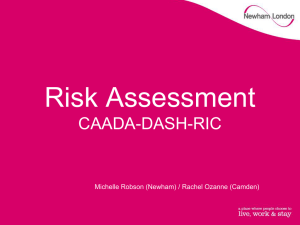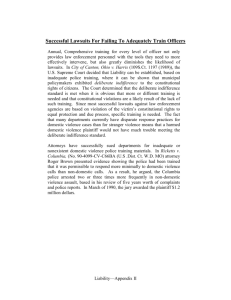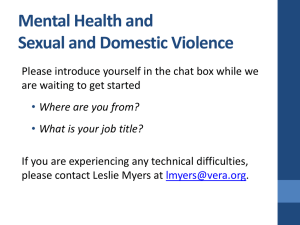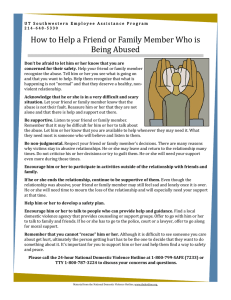Document 11090722
advertisement
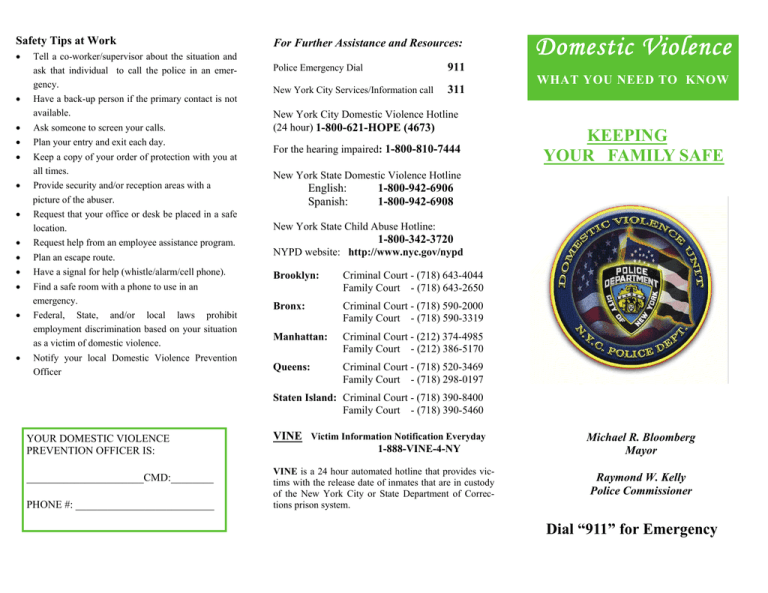
Safety Tips at Work • • Tell a co-worker/supervisor about the situation and ask that individual to call the police in an emergency. Have a back-up person if the primary contact is not available. • Ask someone to screen your calls. • Plan your entry and exit each day. • Keep a copy of your order of protection with you at all times. • Provide security and/or reception areas with a picture of the abuser. Request that your office or desk be placed in a safe location. • • Request help from an employee assistance program. • Plan an escape route. • Have a signal for help (whistle/alarm/cell phone). • Find a safe room with a phone to use in an emergency. • Federal, State, and/or local laws prohibit employment discrimination based on your situation as a victim of domestic violence. Notify your local Domestic Violence Prevention Officer • For Further Assistance and Resources: Police Emergency Dial 911 New York City Services/Information call 311 New York City Domestic Violence Hotline (24 hour) 1-800-621-HOPE (4673) For the hearing impaired: 1-800-810-7444 Domestic Violence WHAT YOU NEED TO KNOW KEEPING YOUR FAMILY SAFE New York State Domestic Violence Hotline English: Spanish: 1-800-942-6906 1-800-942-6908 New York State Child Abuse Hotline: 1-800-342-3720 NYPD website: http://www.nyc.gov/nypd Brooklyn: Criminal Court - (718) 643-4044 Family Court - (718) 643-2650 Bronx: Criminal Court - (718) 590-2000 Family Court - (718) 590-3319 Manhattan: Criminal Court - (212) 374-4985 Family Court - (212) 386-5170 Queens: Criminal Court - (718) 520-3469 Family Court - (718) 298-0197 Staten Island: Criminal Court - (718) 390-8400 Family Court - (718) 390-5460 YOUR DOMESTIC VIOLENCE PREVENTION OFFICER IS: ______________________CMD:________ PHONE #: __________________________ VINE Victim Information Notification Everyday 1-888-VINE-4-NY VINE is a 24 hour automated hotline that provides victims with the release date of inmates that are in custody of the New York City or State Department of Corrections prison system. Michael R. Bloomberg Mayor Raymond W. Kelly Police Commissioner Dial “911” for Emergency SAFETY PLANNING Whatever else you may decide to do, many victims of domestic violence find it helpful to make a safety plan. You can make a safety plan yourself, call the domestic violence hotline or call your local police/housing police service area Domestic Violence Prevention Officer. Do not share this safety plan with anyone who may reveal your plans to the abuser. Whether you are with your abusive partner or have already ended the relationship, there are things you can do that may be helpful in planning for your future safety. Safety while still at home: • • • • • • Practice an escape plan for emergencies. When possible, go over it with a counselor, Domestic Violence Prevention Officer or victim advocate. Teach children emergency escape action and proper telephone use. Use noisemakers such as a whistle or personal alarm to summon assistance. Always keep change for a pay phone set-aside in a safe place for yourself and your children. Ask neighbors to listen, watch and call for police assistance if they see suspicious people, activities, or hear arguing. Notify someone immediately if you think that your abuser is about to become violent. • Choose a code word that you can use with friends, family and children to alert them to call for help. • When violence seems imminent, avoid the kitchen, bathroom and rooms that do not have exits to the outside. • Get an order of protection. • Remember you can use a deactivated cell phone to call 911 for emergencies free of charge. Preparing to leave: • Remember that the danger may get worse while attempting to escape or after leaving a violent relationship. • Review the safety plan with a counselor or Domestic Violence Prevention Officer. Increase your independence by opening a bank account, getting credit cards in your own name and obtaining job skills. • What to do after you leave: • • • Escape Bag – If you leave Prepare a bag, box or suitcase filled with things you will need if you leave. Keep it in a safe place away from home, if possible. You should keep the bag a secret from the abuser or anyone who could tell the abuser you are leaving. Place “original” documents in this bag. Avoid taking items that may alert the abuser to your plan. The bag should contain: ___ Change of clothing for you and your children ___ Spare keys to car and home ___ Medication needed ___ Identification (birth certificates, driver’s license, green cards, work permits, and social security cards for you and the children) ___ Copy of your order of protection ___ Your address book/phone numbers ___ A picture of the abuser for I.D. purposes ___ Personal hygiene products (tooth brush, deodorant, toiletries, etc.) ___ Divorce, custody or injunction papers ___ Diapers, formula, toys and blankets ___ Car, health and life insurance papers ___ Checkbook, ATM card ___ Money, credit cards, bank books, etc. • • • • • • • • • • • If you move, have rental documents, phone, utilities, and all other paperwork that would reveal your new location to the offender in someone else’s name. Install door, window, smoke alarms and metal doors. You may also call the Crime Prevention Officer at your local police precinct/housing police service area for a free crime prevention survey. Get an unlisted phone number (change old number, if necessary) and utilize Special Telephone Services such as: voice mail, caller I.D., call block, call tracing (*57), last number re-dial (*69) or call the Unlawful Call Center at 1-800-518-5507 (formally the Call Annoyance Bureau). A police report may be required by the Telephone Company for unwanted or harassing calls. Use caution when making collect or other calls billed to another number when calling the abuser (these calls can be traced). Use a pay phone instead. Have a tape recording device attached to your phone and available for use when you are speaking to the abuser. Petition for an order of protection if you do not have one. Keep copies of the order at home and with you. Have another person deliver and pick up your children if a judge orders visitation. Use a post office box instead of a street address. Check it during busy hours. Avoid stores, banks and other locations that you have used or visited when living with the abuser. Report suspicious activities and violations of the order of protection to the police. Make special arrangements to pick-up children from school. Make the same arrangements with babysitters. Inform school officials and request that they call you about any unusual contact by the abuser. BM 786-A (7-00)-Pent
